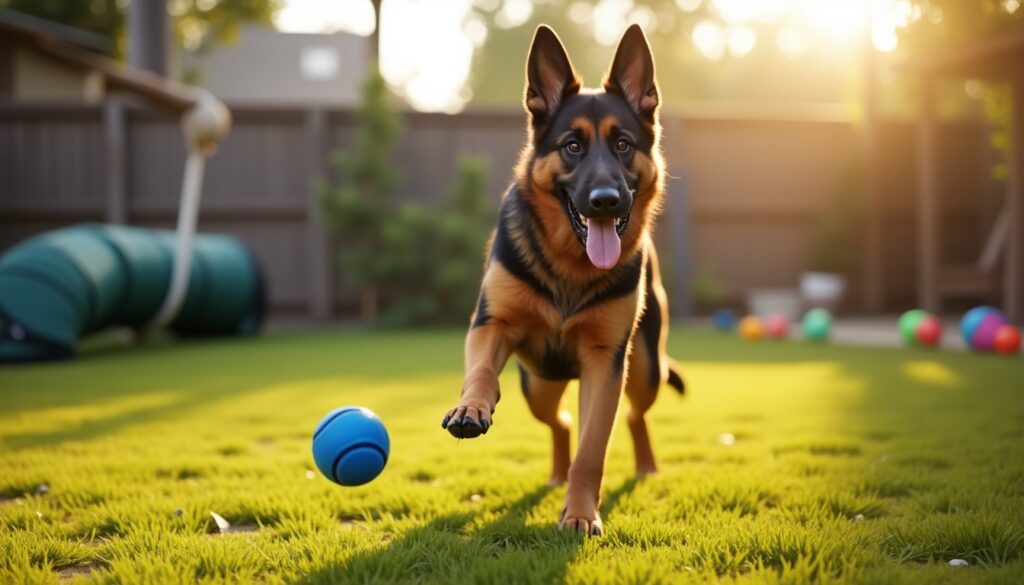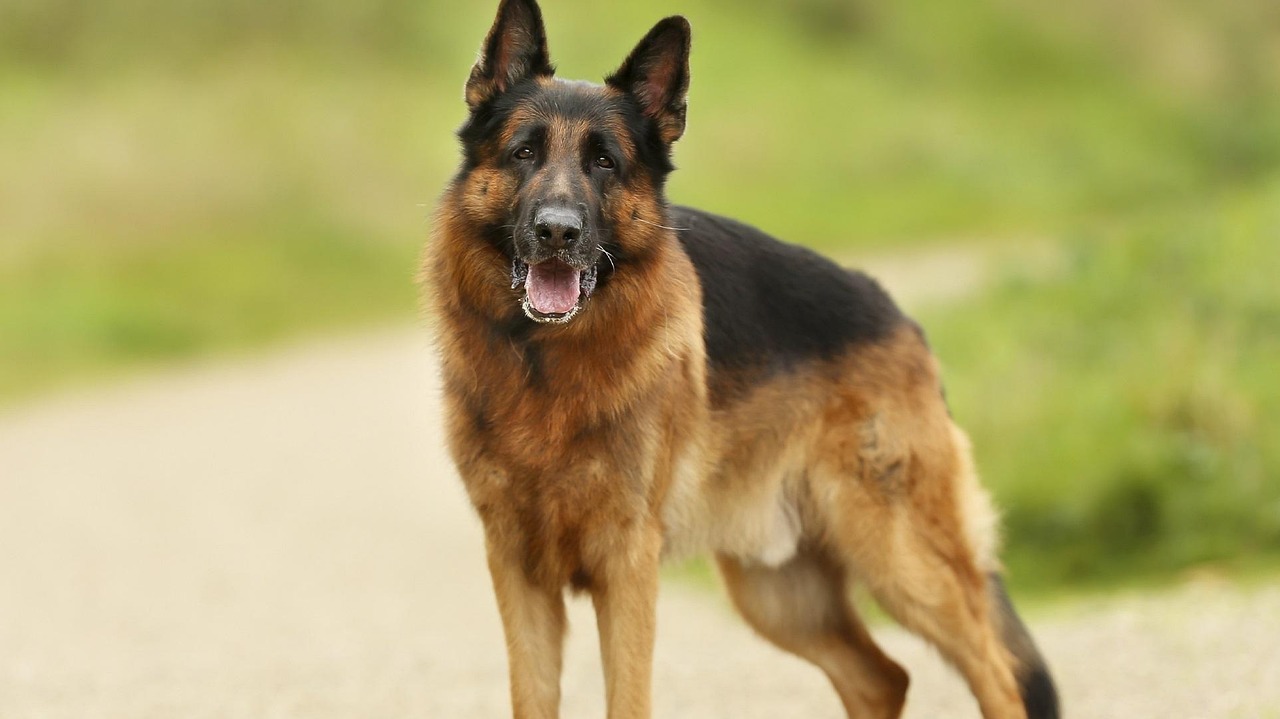German Shepherds rank as the in America, according to the American Kennel Club. Many owners want to know why their German Shepherd is so hyper. The answer lies in their working dog heritage. These dogs were bred specifically to herd and guard, tasks that demand constant alertness and agility. The second most popular dog breed
Studies show German Shepherds need at least one hour of daily physical activity to stay healthy and avoid hyperactive behavior. Their natural energy levels surpass many other breeds because of their working dog background. They tend to show excess energy if they don’t get enough exercise.
A German Shepherd that gets enough exercise becomes happier and calmer. In this piece, you’ll find what makes your German Shepherd so energetic and learn practical, proven ways to channel their enthusiasm positively.
The Root Causes of Hyper Behavior
Your German Shepherd’s hyperactive behavior makes more sense when you understand what drives their energy levels. German Shepherds are different from many other breeds. They have unique traits that naturally make them more active and sometimes seem hyperactive.
Genetic traits and breed-specific energy
Your German Shepherd’s impressive energy isn’t random – it’s exactly how they were meant to be. These dogs were bred through generations to work with humans in demanding roles. Their genetics program them to move and take action rather than just lounge around.
Trainers say German Shepherds have “high drive.” This means they’re naturally motivated to perform tasks, chase objects, and stay active. They don’t choose to be this way – selective breeding has hardwired these traits into their DNA. Quick reactions, alertness, and stamina are part of who they are.
These amazing dogs were originally bred to herd flocks and patrol boundaries for hours without getting tired. They needed exceptional fitness and endurance to do this work. Modern German Shepherds still have these strong traits, even though most don’t work as herding dogs anymore.
Their athletic nature shows up as a need to be active regularly. Their bodies store up “unused energy” when they don’t get enough exercise. This energy has to go somewhere. The result? Behaviors we see as hyperactive – jumping around, running in circles, barking too much, or chewing things they shouldn’t.
Emotional needs and attachment behaviors

German Shepherds’ behavior isn’t just about physical energy – they have complex emotional needs that substantially affect how they act. These smart dogs create exceptionally strong bonds with their families. This brings both good things and challenges.
These dogs experience attachment in their unique way. Selective breeding has made them naturally want to interact with humans and get validation from their owners. This makes them wonderful companions, but it also means they might get anxious when left alone or seek attention more often.
On top of that, their intelligence means they need mental challenges as much as physical exercise. A German Shepherd with nothing to think about is like a brilliant person stuck doing boring work. They get restless and frustrated, so they create their own excitement.
Most owners don’t realize how much emotional needs affect physical behavior. Your German Shepherd might follow you everywhere, bark too much, or become destructively hyper if they don’t get enough bonding time. These aren’t acts of disobedience – they’re your dog’s way of saying their psychological needs aren’t being met.
The connection between your German Shepherd’s genetic programming and emotional needs are the foundations for dealing with hyperactive behavior. Their energy isn’t really a problem – it’s just their natural way of being, and they need the right outlets for it.
Is It Normal for German Shepherds to Be This Energetic?
Your German Shepherd’s endless energy isn’t just normal – it’s part of their DNA. These dogs come with amazing stamina and love for activity that goes back hundreds of years of careful breeding.
Why German Shepherds are naturally active
German Shepherds are alive today. This trait isn’t a bug – it’s a feature. These dogs belong to the herding group and thrive on regular physical activity. ranked among the most high-energy dog breeds
These smart dogs just need 1.5 to 2 hours of daily exercise to stay healthy in body and mind. They might develop bad habits from built-up energy if they don’t get enough activity.
These dogs were bred to work and guard sheep. Their background created dogs that could work all day long. So your German Shepherd’s endless energy isn’t strange – it’s just their genes doing what they’re supposed to do.
How their working dog history affects behavior
German Shepherds’ amazing energy comes straight from their rich working background. Over the centuries, these dogs have taken on many more roles beyond herding:
- Military and police work
- Search and rescue operations
- Tracking and detection work
- Protection and guard duties
In fact, German Shepherds rank third in canine intelligence based on expert studies. They can learn simple tasks in just five tries and follow the first commands 95% of the time.
This mix of brains and stamina makes German Shepherds super versatile working dogs. They excel at everything from finding drugs to detecting mines because of their amazing nose and focus on work, whatever distractions come up.
Captain Max von Stephanitz, who first bred these dogs, described them as “never idle, always on the go”. He knew their high energy needed the right outlet to avoid behavior problems.
Today’s German Shepherd owners should know this working heritage explains their dog’s ready-for-action attitude. Their drive and energy aren’t problems to fix – they’re key traits that need proper direction through exercise, training, and brain games.
Common Triggers That Make German Shepherds Hyper

German Shepherds are naturally energetic dogs. They can become extremely hyper when certain triggers amplify their already active personality. You need to spot these common triggers to create a balanced environment for your dog.
Lack of physical activity
A well-behaved German Shepherd needs regular physical exercise. These high-energy dogs require at least 1.5-2 hours of exercise daily to stay physically and mentally balanced. Most experts suggest two hours of daily physical activity.
Your dog suffers when you skip exercise. Research shows that dogs that get less than an hour of daily exercise are more likely to develop repetitive behaviors. Dogs that don’t exercise enough score much higher on hyperactivity and impulsivity tests compared to those that exercise more than three hours daily.
The effects go beyond simple restlessness. A German Shepherd without proper exercise can turn into what experts call a “one dog demolition team”. They might start destroying things, bark excessively, or have accidents inside the house.
Mental boredom and under-stimulation
Exercise alone won’t calm your hyper dog. German Shepherds need plenty of mental exercise to stay balanced. These smart dogs were bred to do complex work, so they need daily brain games to avoid getting bored.
Mental exercises can wear out your German Shepherd better than physical activity. Without enough mental challenges, German Shepherds often develop problems like:
- Destructive chewing
- Excessive barking
- Restlessness or pacing
- Overexcitement when you return home
You can prevent these unwanted behaviors by adding puzzle games, training sessions, and interactive toys to their daily routine.
Changes in routine or environment
German Shepherds love predictable routines. Any changes – from a new schedule to home renovations or a new family member – can make them hyper.
These reactions come from stress, not disobedience. Your German Shepherd depends on routine to feel safe and stable. Sudden changes create uncertainty that shows up as hyperactivity.
Research proves that dogs left alone for longer periods score higher on hyperactivity tests than those with more company. This shows how being alone, often due to schedule changes, affects your German Shepherd’s behavior.
A consistent routine helps your dog handle necessary changes with less stress. If changes are unavoidable, set up a new routine quickly. This helps your German Shepherd adjust better and reduces their hyper behavior.
When Hyper Becomes a Problem: Signs to Watch For

German Shepherds are naturally energetic dogs, but sometimes their high energy turns into behavior that’s problematic. You need to spot this turning point to fix these issues before they become habits that stick.
Difference between high energy and hyperactivity
The most active German Shepherds should know how to calm down after exercise. But truly hyperactive dogs (those with hyperkinesis) stay aroused and distracted in calm settings, too. These dogs can’t stop fidgeting, struggle to focus on tasks, and show impulsive behaviors that regular exercise doesn’t fix.
The main difference comes down to self-control. A high-energy German Shepherd will jump into activities with enthusiasm but can relax afterward. A hyperactive dog seems to run on full power all the time and doesn’t calm down, whatever the situation.
Destructive or obsessive behaviors
Your German Shepherd’s destructive behaviors often signal that their energy has become a real issue. They might chew up crates, carpet, furniture, doors, baseboards, and personal items. This usually happens because they feel frustrated, stressed, or don’t get enough stimulation.
Beyond destruction, look out for obsessive behaviors like spinning, tail chasing, self-mutilation, or excessive licking. These could point to Canine Compulsive Disorder (CCD), which works like OCD in humans. These behaviors stand out because they:
- Get worse over time
- Won’t stop easily
- Get in the way of normal life
- Might lead to self-harm
German Shepherds tend to develop these compulsive behaviors especially when you don’t give them enough exercise and mental stimulation.
Night-time restlessness and zoomies
Your German Shepherd might get the “zoomies” sometimes – those crazy moments when they sprint around in circles and act playful. These Frenetic Random Activity Periods (FRAPs) usually last 5-20 minutes and are normal, particularly in younger dogs.
All the same, too much nighttime restlessness points to a problem. Watch for pacing, whining, panting, or if they can’t settle down when everything’s quiet. This might happen because they haven’t moved enough during the day, feel anxious, or have health issues.
German Shepherds often show nighttime hyperactivity when they don’t get proper physical and mental exercise during the day. A German Shepherd that’s exercised well should be ready to sleep by evening, not prowling around the house with extra energy.
How to Calm Down a Hyper German Shepherd

Your German Shepherd’s hyperactive behavior needs a balanced approach that works on their physical and mental needs. Success comes from realizing this isn’t just about burning energy – it’s about creating harmony in their daily life.
Daily exercise routines that work
German Shepherds need. Their well-being depends on it. A good exercise routine should look like this:1.5-2 hours of exercise daily
Morning routine: Start with a 30-minute brisk walk or jog and add 10 minutes of obedience training.
Afternoon activities: Quick 15-minute fetch or agility sessions tap into their natural prey drive.
Evening exercise: A 45-minute walk or play session helps them wind down before bed.
Swimming gives them full-body exercise without stressing their joints. This works great for older German Shepherds or those healing from injuries.
Mental games and training for focus
Physical exercise tires your German Shepherd’s body, but mental work exhausts them just as well. The “Focus” exercise teaches them to look at you when asked, which helps redirect their attention from distractions.
Puzzle toys and treat dispensers turn meals into brain games. You can hide treats around your home to challenge their amazing tracking skills.
A game of “hide-and-seek” with toys makes use of their 225 scent receptors. They get mental and physical exercise at once.
Creating a calm home environment
Your German Shepherd mirrors your energy. They stay calmer when you remain relaxed.
Regular schedules for meals, walks, and sleep help them feel secure.
Give them their own space with a cozy crate that becomes their safe zone. Their favorite toys or blankets make it feel like home.
Massage therapy can help extremely hyper German Shepherds relax while bringing you closer together.
Special Considerations for Puppies and Gender Differences
Age and gender shape your German Shepherd’s energy levels and behavior patterns. You’ll need to adapt your approach based on these unique characteristics.
Why are German Shepherd puppies so hyper?
German Shepherd puppies are bursting with endless energy that might feel overwhelming at times. Their hyperactivity comes from their growth stage as they learn about the world and develop their physical and mental abilities.
Puppies do better with several short activity sessions throughout the day instead of long ones. Dog experts suggest you exercise your puppy multiple times daily. To name just one example, see a 4-month-old puppy who needs 20-minute sessions rather than one long hour of exercise, 5 minutes for each month of age
Puppies need structured energy outlets. Their natural excitement can quickly turn into apparent hyperactivity without proper guidance. Start training early – methods like crate training create a safe space that helps develop calm behavior.
Mental exercise is vital for puppies, too. You can tire their active minds with enrichment toys, puzzle feeders, and quick training sessions, which help reduce their hyperactive tendencies.
Are male or female German Shepherds more energetic?
As German Shepherds grow up, their gender-based energy differences become clear. Male German Shepherds typically display higher energy levels with more intense bursts of enthusiasm than females. This extra energy makes them look more playful throughout their youth.
Male shepherds just need 1-2 hours of intense daily exercise that includes running, fetching, and agility training. Their playful nature calls for longer or more vigorous exercise sessions.
Female German Shepherds show more balanced energy patterns. They stay active and need similar exercise time, but their activity levels remain steadier. These females enjoy both active playtime and quiet moments.
Beyond energy differences, females’ minds mature faster than males, which helps them focus better during early training sessions. Males take more time to grow up mentally, so you’ll need extra patience during their “teenage” months when everything distracts them.
Conclusion
Your relationship with your German Shepherd becomes happier and more balanced when you understand their energy levels. Their working heritage directly shapes their stamina and intelligence. Regular exercise and mental stimulation aren’t optional – they’re vital.
Note that a German Shepherd with true hyperactivity is different from one showing typical breed energy. These dogs need lots of daily activity, but they should settle down after enough exercise. You can learn about their unique traits by checking detailed German Shepherd Dog Breed Information.
Managing your German Shepherd’s energy works best with daily routines that mix physical activity and mental challenges. You can channel their natural drive into positive behaviors by starting with structured exercise sessions, adding puzzle toys, and keeping schedules consistent.
Your German Shepherd’s energy patterns change based on age and gender. Puppies do better with short, frequent activity breaks, while adult dogs need longer, focused exercise. Male dogs usually show higher energy bursts than females, though both need similar activity each day.
Your German Shepherd can become perfectly balanced with the right exercise, mental stimulation, and understanding. The key to success lies in working with their natural traits, not against them. This creates an environment where both you and your dog can thrive.
FAQs
Q1. How can I effectively calm down my hyperactive German Shepherd?
Provide plenty of physical exercise through daily walks and play sessions. Incorporate mental stimulation with puzzle toys and training. Establish a consistent routine and create a calm environment. Use positive reinforcement to reward calm behavior and ignore unwanted excitement. Consider activities like agility training to channel their energy positively.
Q2. At what age do German Shepherds typically calm down?
German Shepherds generally start to calm down around 2-3 years of age. However, this can vary between individuals. Consistent training and socialization during their younger years can help manage their energy levels and develop good habits as they mature.
Q3. Why are German Shepherds known for having high energy levels?
German Shepherds were originally bred for herding and working roles, which required high stamina and alertness. This breeding history has resulted in naturally high energy levels, making them one of the most active dog breeds. Their intelligence and physical capabilities contribute to their energetic nature.
Q4. How much exercise does a German Shepherd need daily?
Most German Shepherds require 1.5-2 hours of exercise daily. This should include a mix of physical activities like walks, runs, or fetch, as well as mental stimulation through training sessions and puzzle toys. The exact amount can vary based on the dog’s age, health, and individual energy levels.
Q5. Are male German Shepherds more energetic than females?
Male German Shepherds typically display higher energy levels with more intense bursts of enthusiasm compared to females. They often require slightly more vigorous exercise and may take longer to mentally mature. However, both genders need significant daily activity and mental stimulation to remain balanced and well-behaved.
